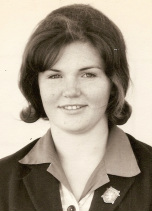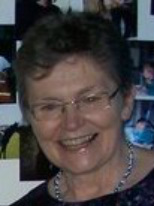Kath McKay (Semmel)
Half a century seems a very long time. Then in other ways it does not. The bookends of those 50 years are my matriculation year at Balwyn High and our reunion in 2012.
In 1961, at the end of form 5, I defied my father, refused to leave school and put myself through that last year of schooling. I did well and obtained a Commonwealth scholarship but could not see my way to go to university without family support. So I went to work. From 1963 to 1966, I was a Trainee Personnel Officer at Massey-Ferguson in Sunshine. In my second and third year with MF, they paid my fees to study at Melbourne University part-time, an unheard of opportunity for a woman in those days.
In 1966 I married and went overseas on a two year holiday working in all sorts of jobs and of course touring the Continent in the obligatory camping van.
Back in Australia in 1968, I became Personnel Officer at Gillette in Noble Park. Then, in 1972 at the age of 27, left to have a baby. I had finally achieved equal pay but there was no maternity leave then, no formal childcare, no expectations that women would work after having children.
Disillusioned with life in the big city, we moved to Albury-Wodonga, then a Whitlam government project to encourage decentralisation of population away from the big capital cities. I was able to return to tertiary studies part-time thanks to the Whitlam Government’s abolition of tertiary fees and a “Married Woman’s Retraining Scheme” grant. Through this tertiary study, I met many of my lifelong friends and it opened my eyes to politics, the world and feminism.
In 1976 when I was pregnant with my second child, my then husband took a job as a Forest Ranger on Lake Blowering, last lake in the Snowy Mountains Scheme. If I thought the suburbs were isolated, they were bustling hubs of life compared to a ranger station in the mountains of NSW. A baby, a 3 yr-old and lots of kangaroos were my companions. I maintained my tertiary studies and that saved my sanity. But it did not save my marriage. Two years in the wilds was enough to clear my mind on that score.
Back in civilisation in 1978, I re-entered the workforce in Social Planning and Community Development with the Albury-Wodonga Development Corporation, a Commonwealth Statutory Authority. This commenced one of the most productive periods of my life. Albury-Wodonga was growing rapidly and I was involved in developing the community and social infrastructure to absorb that increased population. Neighbourhood houses, public radio, community arts, health & education facilities, re-settlement and information programs, indigenous empowerment, multicultural programs, social research, all came under my purview. I was on more boards and committees than I had fingers and toes. And that was just in my paid job! Simultaneously, I became involved with many community activities, particularly focused on the women’s movement. They were heady and fun days. I had a wide circle of friends, highly paid job, public profile, two wonderful kids I was raising as a sole parent. I took up horse-riding and ski-ing.
In 1987, I was ‘head-hunted’ by the Victorian Government and became a Rural Affairs Adviser for the Gippsland Region, heading a social justice unit that covered Bunyip River to the border of NSW. I moved my kids, dogs, horses and household to the Latrobe Valley and took up tertiary studies again, completing another two qualifications including a Master of Arts.
In 1990, the Rural Affairs role ground to a halt following a typical government review. I moved to Gippsland TAFE establishing and coordinating the Diploma of Community Development.
In 1994, after my children had finished their secondary schooling, I moved back to Melbourne as Victorian Manager of Amnesty International, a role that saw me travelling to England, Germany and China as part of major human rights campaigns that included the United Nations Fourth World Conference on Women in Beijing in 1995.
After Amnesty I worked with other non-government organisations such as the Victorian Aboriginal Legal Service and the National Association of Women in Construction. Such a busy life started to take its toll on my health and so in 1998 I made a conscious decision to slow down and set myself up as a small company undertaking independent research, strategic planning and training. Simultaneously, I taught sessionally at RMIT and Deakin universities. My health improved markedly.
And for the past eighteen months I have been retired from the paid workforce. I find this one of the most blissful periods of my life. I am able to do what I want without the pressure of responsibilities that I carried for such a long time in my life. I travel a lot, overseas and in Australia, do family history, garden, and spend a lot of time with friends. I also have two great children and two wonderful grand-daughters, one aged 15, the other 20, They have been a major part of my life.
All this great life has a very strong foundation in my years at Balwyn High School and for that I am forever grateful. I am a passionate advocate for public education and the changes in our society for women. Without these, I would not have been able to live the life I have and do.
Go to the Memories section to read Kath Semmel's Memories of Balwyn High School


